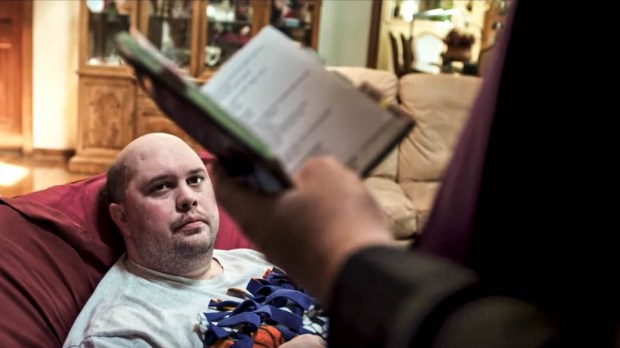Lenten Campaign 2025
This content is free of charge, as are all our articles.
Support us with a donation that is tax-deductible and enable us to continue to reach millions of readers.
In Terrence Malick’s 2012 film To the Wonder, there is
that seems to center the whole story. A weary Catholic priest, played by Javier Bardem, is undergoing a dark night of the soul, but continues to minister to the sick, the elderly, the broken. In a series of intimate, difficult moments, he recites words from St. Patrick’s “breastplate” prayer in the depths of his soul: “Christ in me. Christ beneath me. Christ above me. Christ on my right. Christ on my left.” This impressionistic portrait of accompaniment and grace—made up of bits and pieces of encounters with real people—seemed to be its own story waiting to be told.https://www.youtube.com/watch?v=wTmYWk7kerU
And starting at this week’s South by Southwest film festival, it will be.
The New Yorkerreports:
In 2010, the photojournalist Eugene Richards was hired to join the crew of Terrence Malick’s “To the Wonder,” shooting in the town of Bartlesville, in northeastern Oklahoma … and finding real residents to interact with Bardem. To locate most of his subjects, Richards got the help of a local Episcopal priest, Father Lee Stephens, who pointed him in the direction of Bartlesville residents who had sought his spiritual counsel. Bardem, dressed in his priest garb, sat with them as Richards filmed, and, as Richards puts it, “The basic question of ‘Tell me a little bit about yourself’ grew into something else.” In the end, Malick used only small slivers of the footage in his film. But Richards was so fascinated by the stories he recorded that he petitioned Malick to release the footage to him for his own use.
The resulting 43-minute film, “Thy Kingdom Come,” which will première at the South by Southwest Film Festival in March, includes a few heartwarming tales. Much of what the townspeople tell Bardem, though, is filled with tragedy and hardship. A tearful mother recounts how, while she was napping once on the couch after a grueling nightshift, one of her children accidentally drowned. An emaciated woman battling cancer tells Bardem that her son is the only thing keeping her alive. Another woman tells of being sexually assaulted by men she had considered friends, confiding to Bardem, “I don’t think much of myself, and I never have.”
The title of that piece (“The Americans Who Confessed Their Pain to Javier Bardem”) suggests that whatever else Richards’ film does, it will bring two basic truths about life in America today into focus.
The first is that a lot of people out there—men and women, rich and poor, white and black—are carrying around a whole lot of pain. Modern life boasts a superabundance of technology and entertainment designed to connect and uplift us. Yet the staggering rise in rates of fatal drug overdose and suicide tell a different story: even as we advance by leaps and bounds, people feel increasingly isolated and desperate. Attempts to reduce these trends to politics or economics will always be inadequate; the malady goes deeper, down into the suffering of the spirit, so much of which is the suffering of sin. Without the experience of forgiveness—not only of other people, but of oneself—all of that suffering is just dead weight that will only get heavier.
The second truth is that it doesn’t have to be that way: there are ministers willing to hear their confessions. The New Yorker goes on to note that these shipwrecked souls in Oklahoma didn’t care that Bardem was an actor and not an actual priest. All they knew was that he was there to listen and to lift their burdens—and they confessed.
To be clear, it doesn’t sound like the film will portray the Catholic sacrament of confession. One interviewer points out that what makes these scenes “so especially wrenching” is that there is no discussion of sin, absolution, or prayer—only a revelation of the past and a longing for a “future story.” At the same time, Bardem learned about “the nature of confession” for the role (and Malick apparently looked to photos of a “hands-on” Mother Teresa for inspiration), and the structure and elements of the sacrament of confession— an aching heart, a listening priest, and words of healing—will no doubt be reflected in these
.For many outside of the Church, confession remains a bewildering practice, one that seemingly places a mere mortal between a sinner and God’s love. Even within the Church, enthusiasm for the sacrament has dropped off considerably in recent decades. A 2008 study from Georgetown University asked Catholics how often they went to confession, and 45 percent answered “never.” And that was ten years ago.
But the sacrament is neither so arcane as to not be portrayable, nor so mundane as to not be worth portraying. Instead, what it offers is a concrete step toward a person’s “future story.” In confession, a contrite person hears words of divine forgiveness in a human voice, does penance, and resolves to amend their life. And that’s it. The Church is often lampooned—especially by lapsed Catholics—as revolving around guilt. The irony is that it’s the world that carries the heavy load of guilt and sorrow; the Church, through this sacrament, instead offers a fountain of mercy, healing, and encouragement. “Come to me, all you who labor and are burdened, and I will give you rest.”
That is yet another story waiting to be told. In the meantime, hopefully Thy Kingdom Come will serve as a small but powerful reminder that the Church is always there, ready not only to listen, but to take the weight.

